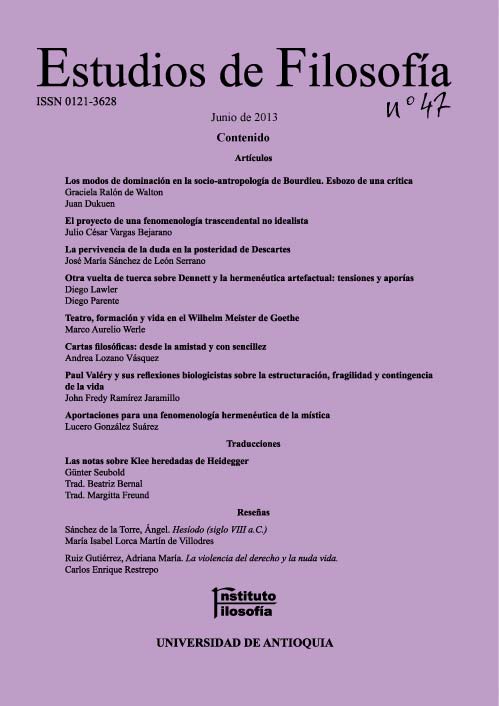Philosophical Letters: Friendship and Simplicity
DOI:
https://doi.org/10.17533/udea.ef.16653Keywords:
Epistle, dialogue, Seneca, Epicurus, Socrates.Abstract
The aim of this paper is to show why and how the simple and friendly tone of the letter makes the learning and internalization of philosophical doctrines possible. First, it will show that the real Socrates and Plato’s character are a precedent for this way of philosophizing. And second, it will characterize the letter as ‘half of a dialog’, in terms of the attention and the peculiarities of the participants, the plain and conversational style and filial relationship between the fictional partners.
Downloads
References
ARRIGHETTI, G. (1973) Epicuro. Opere, Torino: Einaudi.
BIGNONE, E. (1920) Opere, frammente, testimonianze, Bari.
DERRIDA, J. (1986) La tarjeta postal: De Sócrates a Freud y más allá, Trad. Tomás Segovia, México: Siglo XXI.
DIOGENES LAERTIUS. (1966) Diogenis Laertii vitae philosophorum, 2 vols. Long, H. S. (Ed.). Oxford: Clarendon Press.
DIOGENES LAERCIO. (2010) Vidas y opiniones de los filósofos ilustres, Trad. L.-A. Bredlow, Zamora: Lucina.
EPICURO. (1973) Opere, Arrighetti, G. (Ed). Turin: Einaudi.
FOOT, Ph. (1978) Virtues and Vices, Oxford: Blackwell.
FOUCAULT, M. (1990) Tecnologías del yo, Paidós: Barcelona.
GIBSON, R. & MORRISON, A. D. (2007) “Introduction: What is a Letter?”, en: Ancient Letters. Classical & Late Antique Epistolography, Morello, Ruth & Morrison, A.D (Eds). Oxford: Oxford University Press. DOI: https://doi.org/10.1093/acprof:oso/9780199203956.003.0001
GONZÁLEZ, C. (2012) “Elocuencia y persuasión: la retórica estoica y su crítica en Cicerón”, en: Boulê. Ensayos en filosofía política y del discurso en la Antigüedad. Bogotá: Universidad de Los Andes.
HADOT, P. (1998) ¿Qué es la filosofía antigua? México: F.C.E.
INWOOD, B. (2007) “The Importance of Form in Seneca’s Philosophical Letters”, en: Ancient Letters. Classical & Late Antique Epistolography. Morello, Ruth & Morrison, A.D (Eds). Oxford: Oxford University Press. DOI: https://doi.org/10.1093/acprof:oso/9780199203956.003.0006
MACINTYRE, A. (1984) After Virtue: A Study in Moral Theology (2a Edition), Notre Dame: University of Notre Dame Press.
MAURACH, G. (1970) Der Bau von Senecas Epistulae Morales, Heidelberg.
MURPHY, J. (1986) “Ars dictaminis: El arte epistolar”, en: La retórica de la Edad Media, México: F.C.E.
NEHAMAS, A. (1998) The Art of Living: Socratic Reflections from Plato to Foucault, Berkeley: University of California Press.
NUSSBAUM, M. (2003) La terapia del deseo. Teoría y práctica en la ética helenística, Trad. Miguel Candel, Barcelona: Paidós Ibérica.
PLATÓN. (1968) “Laches”, en: Platonis opera, vol. 3, Burnet, J. (Ed.), Oxford: Clarendon Press.
PLATÓN. (1985) “Laques”, en: Diálogos 1. Trad. C. García Gual, Madrid: Gredos.
SÉNECA. (1965) Epistulae Morales ad Lucilium, vols. 1-2, Reynolds, L. D. (Ed.) Oxford: Oxford University Press. DOI: https://doi.org/10.1093/oseo/instance.00169611
SÉNECA. (1977) Cartas a Lucilio, Trad. J. M. Gallegos Rocafull, México: S.E.P.
TRAPP, Michael. (2003) Greek and Latin Letters. An Anthology with Translation. Cambridge Greek and Latin Classics, Cambridge: Cambridge University Press.
Downloads
Published
How to Cite
Issue
Section
Categories
License
Copyright (c) 2013 Andrea Lozano Vásquez

This work is licensed under a Creative Commons Attribution-NonCommercial-ShareAlike 4.0 International License.
Authors who publish with this journal agree to the following terms:
1. The Author retains copyright in the Work, where the term "Work" shall include all digital objects that may result in subsequent electronic publication or distribution.
2. Upon acceptance of the Work, the author shall grant to the Publisher the right of first publication of the Work.
3. The Author shall grant to the Publisher a nonexclusive perpetual right and license to publish, archive, and make accessible the Work in whole or in part in all forms of media now or hereafter known under a Creative Commons Attribution-NoCommercia-ShareAlike (CC BY-NC-SA 4.0), or its equivalent, which, for the avoidance of doubt, allows others to copy, distribute, and transmit the Work under the following conditions: (a) Attribution: Other users must attribute the Work in the manner specified by the author as indicated on the journal Web site;(b) Noncommercial: Other users (including Publisher) may not use this Work for commercial purposes;
4. The Author is able to enter into separate, additional contractual arrangements for the nonexclusive distribution of the journal's published version of the Work (e.g., post it to an institutional repository or publish it in a book), as long as there is provided in the document an acknowledgement of its initial publication in this journal;
5. Authors are permitted, and Estudios de Filosofía promotes, to post online the preprint manuscript of the Work in institutional repositories or on their Websites prior to and during the submission process, as it can lead to productive exchanges, as well as earlier and greater citation of published work (see The Effect of Open Access). Any such posting made before acceptance and publication of the Work is expected be updated upon publication to include a reference to the Estudios de Filosofía's assigned URL to the Article and its final published version in Estudios de Filosofía.















